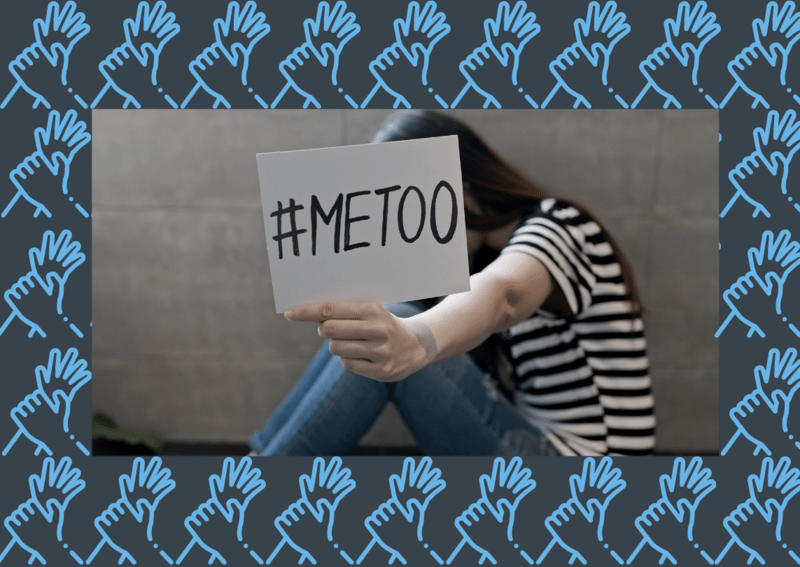It’s Time Schools Took Sexual Assault Seriously
“This school has a rape culture. It’s your choice whether or not you do something about it.” Those are the words I said to an administrator at my Jewish day school her first year working there, my sophomore year of high school.
I entered ninth grade young and naive, with no idea of what lay ahead. Over the course of the next four years, I regularly felt unwanted hands touching me in inappropriate places when my back was turned. On the rare occasion that I saw the perpetrator, I called them out on it. “I didn’t see you” or “I tripped” were the excuses I heard. I wondered how many times somebody could trip in one day.
One day, when this routine occurrence was really getting to me, I brought up sexual assault in my American history class. The boys all rolled their eyes, dismissing it as a distant danger. Seeing their reactions, my teacher drew two columns on the board and labeled them “Boys” and “Girls.” She asked the male students, “What do you do to avoid sexual assault?” They looked thunderstruck. The threat of sexual assault had never crossed their minds; the column below remained blank.
My teacher then turned to the girls in the class and posed the same question; in a matter of minutes, the column was full. Girls in my class never walked home alone at night, always brought their phones with them into bathrooms, and learned how to use household objects as weapons, these being only a few examples of the many precautions they took.
I thought maybe my male classmates were starting to get the message that sexual assault is a serious matter—until I went to math class later that day. There I overheard them talking about how absurd it was that girls do so much to avoid the remote, hypothetical danger of assault. “It’s not like any of you are actually gonna get assaulted,” one boy said. In response, a classmate spoke up about her experience being groped in a public venue. This gave me the courage to share that a 7-Eleven employee once touched my breast. I’d told very few people about this incident before, and I surprised myself as the tale came tumbling out of my mouth. The boys had no response.
My male classmates’ lack of empathy and understanding about sexual assault was part of a generally misogynistic culture I observed at my school. Over the course of my time in high school, I experienced a lot of sexism. There were jabs about girls being less intelligent, jokes about women belonging in the kitchen, and constant objectification of female students’ bodies.
The problem was compounded by the fact that my school lacked comprehensive education about sexual assault. We had a total of two sex education lessons in our curriculum: one in tenth grade, and one in twelfth. This was clearly not enough, considering that many boys did not understand the parameters of consent. For example many were unaware that someone drunk cannot consent.
There’s an understanding among the student body that because of my school’s religious affiliation, students shouldn’t engage in sexual activity before marriage, and so there is no need for sex education. But that approach ignores reality. People hook up in high school —including at Jewish day schools. By turning a blind eye to this reality, my school perpetuated a culture of sexual assault and ignorance.
Sexual assault is a nuanced topic that requires a lot of education and discussion. Many men can’t begin to understand the fear of assault that women experience daily. It often seems like men live in a world of ignorant bliss, where they don’t have to worry about being alone late at night or feeling as though someone is following them. Women, on the other hand, often learn defensive techniques to be prepared for the worst-case scenario.
But these defenses are also fueled by misunderstandings of what constitutes sexual assault. People often picture assault as a random man coming up to a woman on the street and taking advantage of her. However, a 2018 study found that more than 90% of rape and assault victims know their attacker. Being pressured to go further than you are comfortable going or having a sexual encounter when you are incapacitated are both cases of assault. Tragically, many victims brush off these experiences as “no big deal” because they don’t know any better.
Worse yet, when people do speak up about what they’ve gone through, they’re often torn down and attacked as uncredible, which only encourages others to keep their mouth shut and sweep their experiences under the rug. That definitely has been true for me and the peers that I’ve talked to—though we regularly felt uncomfortable with unwanted physical contact in the hallways, none of us ever discussed it with an adult. We didn’t want to make a big deal out of something that could be nothing. We weren’t the first to feel that way, and I doubt we’ll be the last.
I wish that this piece had a happy ending. I wish I could say that my school learned the dangers of a lack of sex education and did better, that my conversation with my administrator made any difference. But that’s not the case. To this day, my school doesn’t have a comprehensive sexual education curriculum. I set the facts out before them, and I wasn’t the first to do so, but they chose to ignore it, pretending the pervasive problem wasn’t present.
I haven't let that discourage me. If the #MeToo movement has taught us anything, it’s that individuals have the power to make change and hold abusers accountable. So wherever you are, whatever kind of school you attend, whatever community you’re a part of—speak up. Get educated about sexual assault and educate those around you. There won’t be a change overnight, but every person who truly understands sexual boundaries is a person you’ve helped—and possibly saved.







Very courageous to speak out about your high school and public places like 7 Eleven. It forces me as a make to examine myself.
For all of my friends tagging this school on Facebook with their #pride, they’ve been shamefully, publicly silent on this issue for their children who go there. Still no sex ed until 10th grade? What year is this? Stop over-paying for this mediocrity. Parents and school administrators owe these kids better.
What a brave essay. I am so sad that in 25 years...nothing has changed at this particular institution as I (and many friends) experienced the same. Rena, kol hakavod.
Thank you for bringing up this important subject matter. It took courage to write about this, and it's effects are already being felt. It is imperative for our Jewish Day Schools to start taking sexual assault and unwanted interactions seriously. If we are to uphold the values of Derech Eretz we must make matters of sexual assault and abuse part of the education and behave proactively.
Rena - I am so proud of you! You speak for many. Your moral clarity and fearlessness is an example. Our schools can and should do better to educate students for the world they are in, not the one we want to pretend or wish exists.